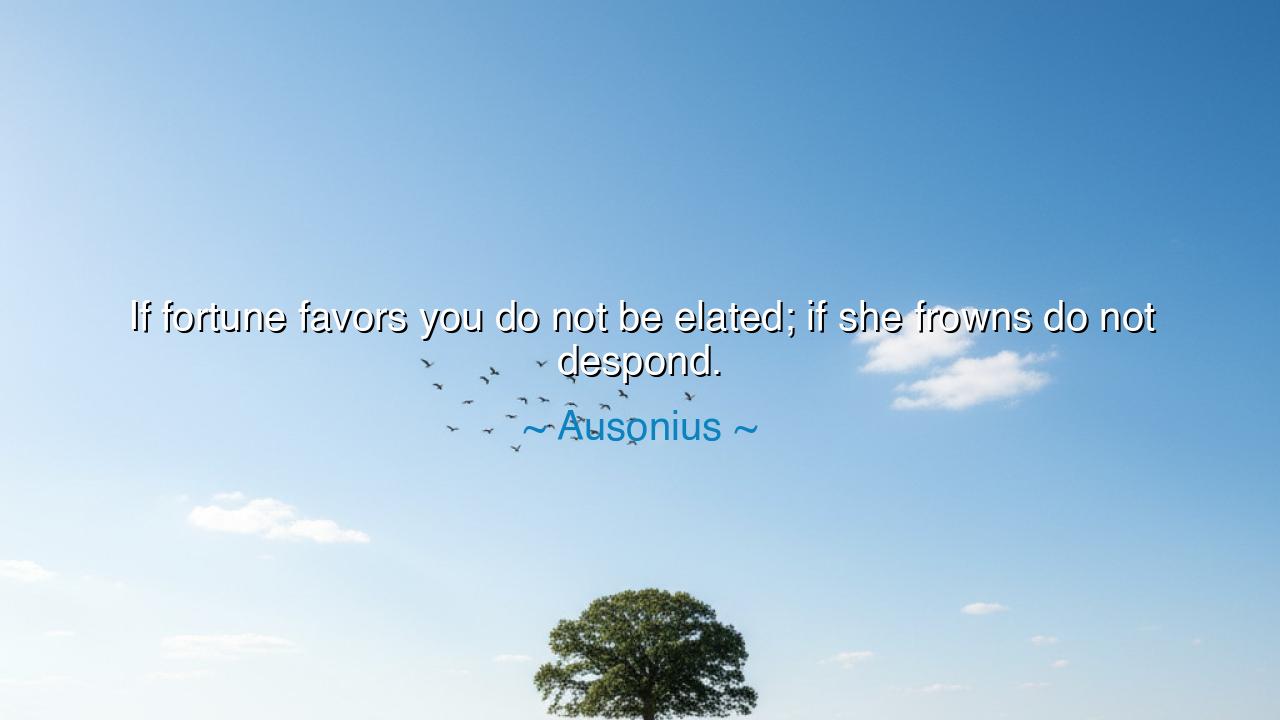
If fortune favors you do not be elated; if she frowns do not






"If fortune favors you, do not be elated; if she frowns, do not despond." Thus taught Ausonius, the Roman poet and statesman, who lived amidst the shifting tides of empire. His words shine with the wisdom of the ancients: that life is a wheel, and fortune spins it without care for man’s desire. To rise too high in joy when she smiles is folly, for her face will soon turn. To sink too deep in despair when she frowns is weakness, for her favor may return. True strength lies in constancy, unmoved by her caprice.
The ancients often depicted fortune as a goddess, blindfolded, standing upon a wheel. She raised men up and cast them down with the same careless hand. Kings became beggars, beggars became kings, and none could bind her. Thus, the wise learned to treat her gifts with moderation, neither exalting themselves in victory nor breaking in defeat. Balance was their shield, for fortune could not pierce the heart that remained steady.
Consider the tale of Marcus Aurelius. As emperor of Rome, he knew both the blessings of triumph and the anguish of loss. Plague swept through his armies, wars battered his borders, yet he bore it with serenity. In his Meditations, he reminded himself that fortune is fleeting, that to become elated in success or crushed in sorrow is to be a slave to her wheel. By standing firm, he proved that the soul can rise above what fortune bestows or withholds.
So too in later ages, Abraham Lincoln embodied this wisdom. When victory crowned his cause, he did not exult with arrogance; when defeat struck, he did not collapse in despair. Through patience and constancy, he endured the long trial of civil war until his nation was preserved. Had he been elated by praise or broken by failure, his strength would have faltered. Instead, he walked the path Ausonius described: steady, unshaken, resolute.
Therefore, let this truth be passed on: fortune is but a tide, rising and falling beyond man’s command. To build your spirit upon her gifts is to dwell upon sand; to anchor yourself in constancy is to stand upon the rock. Rejoice without pride, endure without despair, and you shall master what even kings cannot: freedom from the whims of fortune.






GDGold D.dragon
There’s an ethical dimension I’d like clarity on. If outcomes often hinge on circumstance, how do we keep gratitude and solidarity foregrounded? I’m drawn to practices that metabolize good breaks into shared resilience—windfall tithes, mentorship, and mutual-aid commitments—while treating misfortune as a call for community, not isolation. Could you sketch a personal covenant that links emotional steadiness to civic action: a gratitude ledger that triggers giving, a setback protocol that asks for help early, and periodic reviews to prevent sliding into fatalism or pride?
NTHoai Nguyen thi
In teams, I worry about the success hangover and the failure doom-loop. Could you propose a paired postmortem format that treats both outcomes as data? For wins: identify non-repeatable windfall factors, isolate the few controllable moves, and set a humility safeguard. For losses: name the preventable errors, capture one design change, and schedule a retry at a defined scope. What metrics show a culture is learning rather than oscillating—shorter recovery time, fewer repeat mistakes, and stable quality under pressure?
GPThai Gia Phat
Psychologically, I’m thinking about mood regulation. Elation can shrink risk perception; dejection can narrow problem-solving. What everyday practices keep perspective without numbing—breath drills, HRV biofeedback, values reminders, and reframing prompts that ask, “What’s skill, what’s luck, what’s learning?” I’d love a weekly template: one success noted with a repeatable behavior, one failure paired with a reversible experiment, and one kindness extended to myself or others. How do we guard against the trap of toxic stoicism while still cultivating steady attention?
TDThuy Duong
From a personal finance angle, the line suggests calm during market whiplash. But pure detachment can morph into neglect. What rules keep behavior disciplined yet humane—automatic rebalancing bands, a written investment policy, and a cooling-off window before major trades? I’m curious how to fold emotions in constructively: maybe journal the feeling, then translate it into a stress test instead of a transaction. Could you outline a simple checklist for distinguishing a genuine thesis change from a dopamine-driven lurch?
KKawaosaki
As a reader, I hear counsel for emotional ballast, but I also don’t want to sterilize joy or ignore grief. How do we celebrate wins wholeheartedly without slipping into entitlement, and process losses honestly without feeding hopelessness? I’d love a practical ritual: a short savoring moment after good news (gratitude, credit the helpers), followed by a sober inventory of repeatable skills; and after setbacks, a time-boxed lament, then a tiny next action. Is there research-backed guidance on how long to linger in either mode before re-centering?